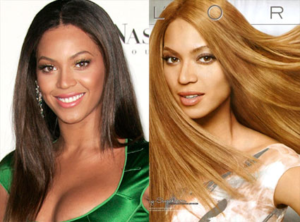By Sarah Grooms
Col•or•ism
Noun
prejudice or discrimination against individuals with a dark skin tone, typically among people of the same ethnic or racial group.
I want us to be aware of who we are speaking about when we talk about whom colorism affects. In my and other’s experience, whenever a dark skinned Black person is speaking on their oppression on colorism, whether on social media or otherwise, the conversation is hijacked by a light skin person crying about how they were bullied for being pretty and light skin, or that dark skin girls harbor jealousy, or that the conversation is pointless because we are all black and deal with racism. We need to recognize that this is not systemic oppression, those are hurt feelings.
While it is true that Black people of all hues face difficulty navigating society and face discrimination, one has a significantly easier experience when they are light skinned. These are the consequences of centuries of slavery and colonization. In America, lighter slaves, who were the products of interracial relations between master and slave, received preferential treatment and advantages that their darker skinned counterparts weren’t afforded. This tradition persisted even after slavery, and translated to better economic and educational opportunities for lighter Black people. Light skin was thus associated with upper class society.
We carried on colorist traditions well into the 19th and 20th century, when we created the “Brown Paper Bag Test” in order to deny access to social circles, and even jobs. While we may no longer be holding up paper bags to peoples faces, there is a large body of research that shows how your upward mobility is still affected by skin color. Studies show that light skin men and women receive lighter prison sentences, and are seen as less criminal. A study conducted in 2011 found that a light skinned Black male with a bachelor’s degree and little work experience had better chances at getting a job than a dark skinned counterpart with an MBA and several managerial positions. These disparities play out in romantic spheres as well.
Light skin black women have been traditionally seen as more desirable. For centuries, White women were raised as the peak of feminine beauty. Thus, Black women who had more Eurocentric features, lighter skin, a thin nose, straighter hair, were seen as more attractive. Reports show that light skin women have a 15% greater chance at finding a spouse. However, people don’t realize the ways they perpetuate colorism. Charlamagne Tha God and DJ Envy caused controversy when they suggested during an interview with Amara La Negra that her struggles as a dark skinned woman was all in her head. The closer proximity one has to whiteness, the more social value they had. So before I move on I would like to make a note of saying I do not believe in the fetishization of light skin black people . Light do not and never will equal right. It goes without saying that we should be embracing the beauty of our melanin, and judge people based on character.
However we are guided by our biases, and judge based on the surface. Dark skinned folk are viewed as more aggressive, dangerous, untrustworthy, unattractive, ignorant, and hyper-sexual. These stereotypes have been abundant in media for over a century. I’m sure we’ve seen the parallels drawn in films and shows like Coming to America, House Party, Martin, The Proud Family, and a myriad of other examples. Black women in Hollywood have spoken against its colorist attitudes, and the opportunities that are afforded to Black women with a specific aesthetic. I’m also sure we’ve seen the memes of Moore and rapper Suga Free, the jokes about the exclusivity of light skinned women, and the countless statuses and tweets that posit light skin men as soft and sensitive. If dark skin on Black women is associated with masculinity, light skin on Black men is viewed as feminine.

These attitudes don’t just plague African-Americans. Slavery and colonialism abroad has left an ugly legacy that leaves our darker kin in the diaspora with a warped self-perception. In 2017 alone, skin-lightening creams were a $17.9 billion market. Men and women in South East Asia, Africa, and the Caribbean want the social benefits that accompany light skin. According to reports 25% of the women in Mali, 77% of the women in Nigeria, and 59% of women in Togo use skin creams. Doctors in Nigeria were horrified to discover mothers who were applying cream on their infants skin to make them lighter. The issue is such an epidemic that Rwanda, Ghana, and the Ivory coast have all placed nationwide bans on lightening products in the past four years. The chemicals in these products, many which contain mercury, do severe damage to one’s skin over time, and also causes internal organ damage and failure. However, even knowing this, some still believe the benefits outweigh the risks.
Picture this : growing up as a dark skin girl you only ever saw yourself painted as bitter, no man, unworthy of love, seen as aggressive, and painted as unattractive. Imagine looking at your light skin sisters be seen as the standard of black beauty. What kind of self image do you think seeing these things will build in little dark skinned girls? To pretend representation in the media is not important, to pretend that one’s preferences are born in a vacuum, and to pretend that colorism doesn’t have real world consequences is to be plainly obtuse.
So when your dark skin friend is talking about their oppression please think about the criminal injustice , lack of positive representation and the abundance of negative imagery, and how they must move in this world, simply shut up, and listen. The first step to handling this issue is quiet empathy. The next is realizing the ways we pass these attitudes to one another. Lastly, realize the difference in people’s experiences. It was never a competition, but your hurt feelings don’t begin to match their systematic oppression.






Excellent article. Keep writing such kind of information on your blog.
Im really impressed by your site.
Hi there, You have done a great job. I’ll definitely digg it
and personally recommend to my friends. I
am confident they will be benefited from this website.